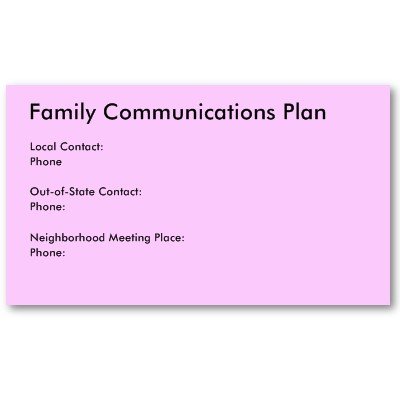Your family may not be together when disaster strikes, so plan how you will contact one another. Think about how you will communicate in different situations.
Complete a contact card for each adult family member. Have them keep these cards handy in a wallet, purse or briefcase, etc. Additionally, complete contact cards for each child in your family. Put the cards in their backpacks or book bags.
Check with your children’s day care or school. Facilities designed for children should include identification planning as part of their emergency plans.

Family Communication Tips
Identify a contact such as a friend or relative who lives out-of-state for household members to notify they are safe. It may be easier to make a long-distance phone call than to call across town, so an out-of-town contact may be in a better position to communicate among separated family members.
Be sure every member of your family knows the phone number and has a cell phone, coins or a prepaid phone card to call the emergency contact. If you have a cell phone, program that person(s) as “ICE” (In Case of Emergency) in your phone. If you are in an accident, emergency personnel will often check your ICE listings in order to get a hold of someone you know. Make sure to tell your family and friends that you’ve listed them as emergency contacts.
Teach family members how to use text messaging (also known as SMS or Short Message Service). Text messages can often get around network disruptions when a phone call might not be able to get through.
Subscribe to alert services. Many communities now have systems that will send instant text alerts or e-mails to let you know about bad weather, road closings, local emergencies, etc. Sign up by visiting your local Office of Emergency Management web site.
